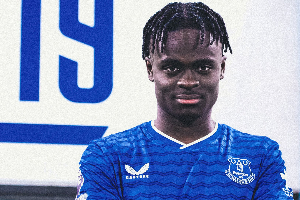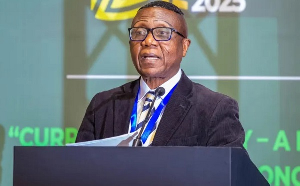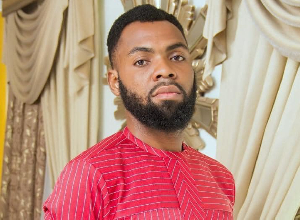Opinions of Monday, 26 August 2019
Columnist: Isaac Ato Mensah
Arnold Boateng: Loyalty and oaths of secrecy
Arnold Boateng resigned last week from the board of Ghana’s National Youth Authority, with a curiously worded letter.
He alleged wrongdoing and yet refused to disclose details on grounds of an “oath of secrecy”.
“It all beggars belief,” my mentor concluded in exasperation. “An oath of secrecy does not cover wrongdoing or illegality.”
To those who might want to debate what an oath of secrecy is not: Will you accept that Bank of Ghana officials refuse to disclose to a judge details of the banking scandal because they swore an oath of secrecy?
The position of case law has been to stress the fundamental importance of our national CONSTITUTION, such that it overrides what are in effect Non-Disclosure Agreements sometimes called Oaths of Secrecy.
“Oaths of secrecy should not be misconstrued as providing cover for subverting the Constitution and Laws of this country or any country for that matter,” my mentor further explains.
Even the doctor’s privilege of nondisclosure (patient confidentiality) is not absolute.
In very exceptional cases, when overriding interests or conflicts of duties are at stake, a duty may arise to breach the professional secrecy oath when the doctor is confronted with information that, if not reported, will lead to “direct and severe” harm to another individual.
Boateng wrote of “The coming perfect storm”.
This piece is not about that “coming perfect storm”.
Those Boateng addressed can even beat his expectations and win elections for the next 30 years; that is not what is needed to develop the youth of this country.
Certainly the uninitiated and party hawks will scream loyalty.
However, the duty of loyalty is not absolute, and public criticism by public servants and by extension party members serving on public boards may be justified in certain circumstances.
These include situations where the government is engaged in illegal acts; and where government policies jeopardize life, health or safety.
Here are ONLY three serious questions for all of us:
One, how many appointees, past and present, in Ghana, who took this oath of secrecy think that it means when they report wrongdoing – theft, conspiracy to murder, breach of laid down procedure etc – they will be punished……maybe the government will send thugs to eliminate them?
Two, how many of the criminally minded who have held public office, past and present, have used such interpretations of an oath of secrecy to commit or cover up crime – including corruption, theft and murder?
Three, going forward, will the paid hirelings take critics as relevant to their work, or they will still resort to the tired, discredited banality, “Are you with us or against us?”
Arnold Boateng certainly knows more than he has written. Nevertheless we must commend him for resigning because he could no longer countenance wrongdoing.
No doubt there are many people who due to their daily bread (aka nokofioo), will continue in their rent seeking behavior until it is too late;they end up in jail or corrupt themselves irreversibly.
The last time I had a debate over such an issue involving a public office holder on radio, and suggested I would have resigned, an elderly person told me I was not being pragmatic; that bread and butter issues are at stake.
“What is more pragmatic than adhering to integrity rules?” my mentor queried.
Hence, it is fair to say that it shows no moral virtue if anyone in Boateng’s shoes waited and cemented her/his financial position before resigning.
Do armed robbers or pickpockets or coup makers ever cement theirs; is their booty or loot ever enough?
In the Ghanaian context where resignations are rare, Boateng’s resignation unfortunately offers very few teaching points.
He sees wrong doing but will not report it.
He misunderstands the import of an oath of secrecy; his write-up speaks of the general poor performance of his party in government vis a vis the main opposition leader, rather than what the youth of Ghana need which the National Youth Authority are no doubt clueless about.
And to cap it all, “the youngest MP” in Ghana – Francisca Oteng Mensah, 26-year old MP for Kwabre East constituency, is the chairperson of National Youth Authority (NYA).
Let us get a confirmation from the elephant’s own trumpet:
“The President is determined to address the challenges facing the youth sector and thus, has appointed a very dynamic and hardworking young member of parliament for Kwabre East Constituency to lead the authority, charged to develop the capacity of youth to participate in nation building,” said Isaac Kwame Asiamah, the minister for youth and sports when he inaugurated the 15-member NYA board, in a story published by GNA on 20 December, 2017.
Now, unless you believe that hiring a drone service is the solution to medical supplies in Ghana, then conjuring a direct correlation/causation between age of appointees and solving the massive problems of Ghana’s youth is a disingenuous exercise; an excellent example of bogus identity politics.
Or should we all simply take oaths of secrecy and refuse to expose wrong doing?
Feedback; ato@writersghana.com; www.writersghana.com; LinkedIn, Isaac Ato Mensah; Instagram, @atomenswriters; Twitter, @Atomens; Facebook, Writers and Shakespeares Ghana; Telegram, Isaac Ato Mensah; Quora, Isaac Ato Mensah. WhatsApp (+233) 020 022 0353.
Writers and Shakespeares Ghana Limited exist to be a moral and intellectual guide to the best practice of PR and integrated communications around the world, beginning with Ghana.














